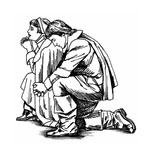
Dying Alone During the Pandemic: The Example of St. Augustine
GUEST COLUMN
Over the past few months, since the COVID-19 pandemic threw our lives into chaos, many of those infected with the coronavirus have died alone in quarantine without their loved ones physically present. The inability to be with the dying, as one CNN journalist described it, “seems to feed on our deepest fears and prey on our primal instincts” (March 29). Dying alone, we are told, is a fate worse than death itself.
Although this fear is understandable, Catholics need not view the possibility of a solitary death with despair. Rather, dying alone can be an occasion for reconciliation with God. St. Augustine of Hippo, the Doctor of Grace, offers us a model of how this might be possible.
No one would call Augustine an introvert. Throughout his life, he was surrounded by friends and family. Probably the most famous story about him involves the time he was an adolescent and, with a group of friends, stole pears to throw at some pigs. They did not need the pears because they could get tastier ones than those they had stolen. They stole them merely for the excitement of doing what was forbidden. “It was foul and I loved it,” Augustine later recounted in his Confessions. “I loved the self-destruction, I loved my fall, not the object for which I had fallen but my fall itself.” The true thrill for him, however, was not the theft itself but thieving in the company of friends. Had he been alone, he tells us, he never would have done it.
Not all of Augustine’s friendships were so destructive, however. Years later, upon returning home after studying in Carthage, he befriended an unnamed young man whom he had known when they were both boys. They had many interests in common and must have engaged in lengthy conversations about religion because Augustine convinced him to become a member of the Manichaeans (the “fashionable new-age sect” of the late-ancient world, as James J. O’Donnell has described it) as Augustine was at the time. A year into their friendship, his friend contracted a fever and fell unconscious. With Augustine at his side, his family had him baptized, only for his health to improve. Assuming his friend would be as dismissive as he was, Augustine mocked his Baptism. His friend, however, had been transformed by the experience, and he informed Augustine that, if their friendship were to continue, he must not speak so condescendingly. Several days later, without Augustine by his side, his health relapsed, and he died. Augustine was desolated: “Everything on which I set my gaze was death. My hometown became a torture to me; my father’s house a strange world of unhappiness; all that I had shared with him was without him transformed into a cruel torment. My eyes looked for him everywhere, but he was not there.” Even 20 years later, Augustine’s pain was still so raw that he could not bear to write his friend’s name.
You May Also Enjoy
The willful suppression of the sacraments by Catholic leaders could portend the diminution of the Church in both numbers and influence.
For humanists, the religious impulse is redirected from traditional religions toward a secularized system of values such as egalitarianism and bodily health.
Technology cannot erase our humanity. We will find a way to live and even flourish in a world saturated with technology.

